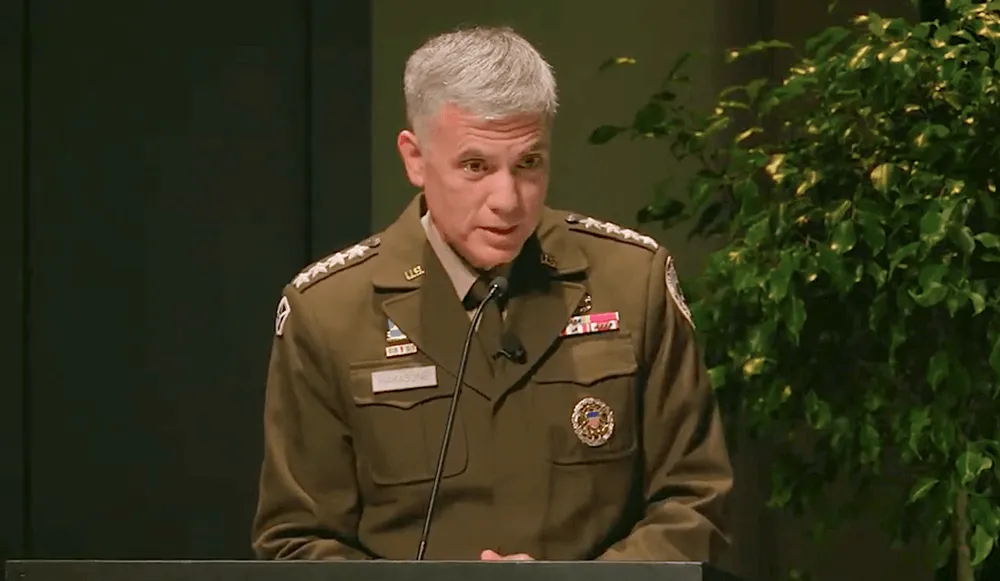Nakasone on the military’s cyber strategy, surveillance powers and ‘hunt forward’ missions
NASHVILLE — U.S. Cyber Command Gen. Paul Nakasone sat down with reporters after his closing keynote address at the Vanderbilt University Summit on Modern Conflict and Emerging Threats to weigh in on a number of cybersecurity topics.
Here are the highlights the talk with Nakasone, who also helms the National Security Agency:
DoD cyber strategy: The Pentagon is readying to release its latest cyber strategy in five years. In 2018 the previous version shifted the agency away from a mostly responsive footing to a strategy of “Defend Forward,” meant to counter adversary behavior as close to the source as possible. Cyber Command executes it through an approach of “persistent engagement” — meaning American operators must constantly, and quickly, interact with adversaries in cyberspace.
“I don't think it's that dramatically different from” 2018, Nakasone said of the forthcoming document. “There was a huge inflection point in 2018 with the Defend Forward. I don't see, necessarily, a huge change in the strategy coming out. I think it [has] important changes, but ‘18 was monumental for us.”
He suggested the strategy’s content is “more along the lines of how do you become much more agile” and foster partnerships with other organizations, including internationally. “I think you're gonna see a lot more than that,” Nakasone said. “I think there's a much greater role in terms of, how do your allies play into this, both from the spectrum of how do you use your allies in a way that adds to your capabilities but also how do you assist in their protection?”
Section 702: Nakasone said the U.S. clandestine community would suffer if Congress fails to renew Section 702 of the Foreign Intelligence Surveillance Act before the end of the year. The statute allows the federal government to collect the emails and electronic communications of foreign intelligence targets but also incidentally hoovers up the personal data of Americans.
The FBI has “very, very unique authorities that the National Security Agency will not pick up. This is the domestic element of what goes on. We do not operate in the United States and so this will be tremendously challenging,” he said.
He predicted that as the renewal debate goes on the FBI will show queries are used to determine victims of hacks. “This is something that I think will play out as the bureau talks more and more about it.”
Ukraine: The Army four-star general predicted Cyber Command — which has sent “hunt forward” teams to Ukraine to bolster its digital defenses — would continue its support as Kyiv’s conflict with Russia drags on into the summer.
“I bet you there's a bigger call for that in terms of hunt forward operations,” he said, noting NATO countries are working to strengthen their cybersecurity.
But otherwise, Nakasone anticipated Cyber Command’'s work with U.S. European Command “is not going to change a lot.”
Russia: Nakasone said he is “watching very carefully” for how Russian hackers might employ generative artificial intelligence to propel Moscow’s influence operations in the future.
“This is the nation that does the best influence operations. I've watched them,” he said. “And so, will we see a change in that type of work? Will they start moving towards greater online videos or recordings that are different?”
NATO: Digital attacks on alliance members remain at “the same level” since the destructive assault on Albania last year that has been attributed to Iranian hackers.
In that instance, the U.S. deployed a host of help to the country, including Cyber Command deploying a team of operators to get government services back online.
“We have not seen a rise” in attacks, according to Nakasone.
Martin Matishak
is the senior cybersecurity reporter for The Record. Prior to joining Recorded Future News in 2021, he spent more than five years at Politico, where he covered digital and national security developments across Capitol Hill, the Pentagon and the U.S. intelligence community. He previously was a reporter at The Hill, National Journal Group and Inside Washington Publishers.



